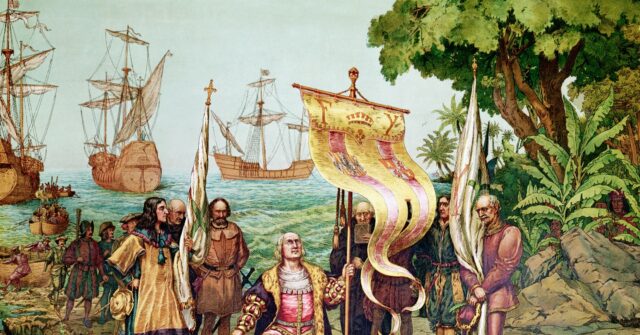Recent research by Spanish scientists has challenged the traditional narrative surrounding Christopher Columbus’s origins. Historically recognized as an Italian from Genoa who navigated under the Spanish flag, a two-decade investigation led by Professor Miguel Lorente Acosta from the University of Granada suggests that Columbus may have actually descended from a Jewish family in Spain. This claim stems from DNA analyses of the remains of Columbus and his son, Hernando, which reportedly indicate traits compatible with Jewish ancestry, alongside a western Mediterranean origin. These findings, presented in a documentary during Spain’s national day, assert that Columbus was likely not Italian, proposing instead that he hailed from regions such as the Spanish Mediterranean or the Balearic Islands.
The research team not only relied on genetic testing but also examined around 40 letters signed by Columbus. Their analysis found a notable absence of influences from the Italian language, noting that communications with a bank in Genoa were written in Castilian Spanish. This linguistic evidence led the researchers to conclude that Columbus’s background was rooted in Spanish-speaking regions rather than Italy. Prof. Lorente Acosta highlighted that, although the investigation pointed towards several potential origins, Sicily was a less plausible option due to the absence of Italian characteristics in Columbus’s writings.
In parallel to these findings, historian Francesc Albardaner has advocated for the theory that Columbus originated from a family of Jewish silk weavers in the Valencia region. He postulated that during Columbus’s lifetime, Jews were subjected to restrictive laws in Genoa that limited their stay to three days. With about 200,000 Jews residing in Spain at that time compared to around 10,000 to 15,000 in Italy, Albardaner suggests that Columbus likely concealed his heritage to avoid the religious persecution rampant during the period, including the Spanish Inquisition. He notably points out that Columbus’s expeditions occurred in 1492—a year marked by simultaneous events of Jewish expulsions from Spain and Columbus’s voyage that would lead to the discovery of the New World.
Albardaner’s assertions highlight the intense atmosphere of religious scrutiny during Columbus’s life. Columbus would have faced severe consequences had his Jewish origins come to light, possibly leading to execution, thereby necessitating the façade of a devout Christian. This narrative serves to complicate contemporary interpretations of Columbus as a symbol of colonialism, revealing a hidden layer of personal strife wrought by his ethnic identity. Furthermore, this idea aligns with growing calls for a more nuanced understanding of historical figures within the context of their times, moving beyond simplified categorizations of heroism or villainy.
Throughout history, speculation regarding Columbus’s Jewish roots has been supported by various scholars. Tobias Brinkmann, a Professor of Jewish Studies and History, notes that Columbus’s maternal line included traditionally Jewish names, such as Abraham and Jacob, which were common among Jewish families in Spain. Additionally, the weaving profession of Columbus’s ancestry was often correlated with Jewish communities in Spain, further insinuating a Jewish lineage. Columbus is also said to have employed a diverse crew, including Jews and Conversos, who were those compelled to convert to Christianity. This choice of crew members is interpreted as a reflection of Columbus’s possible desire to support and safeguard Jewish people during a time of systemic persecution.
Some historians take this exploration further by speculating that Columbus’s voyages were motivated by a quest for a new homeland for Jewish communities seeking refuge from persecution. The implications of such an interpretation suggest that Columbus was not merely a seeker of riches or glory, but perhaps someone invested in fostering a safe haven for his people. In a historical context marked by discrimination and forced conversion, such motivations reveal the potential complexity of Columbus’s identity and aspirations.
Ultimately, this ongoing inquiry invites a reconsideration of Columbus’s legacy and emendation of the historical narrative, emphasizing the substantial role of his Jewish heritage in shaping his life and decisions. Concealed under layers of historical myth and modern interpretation, his identity elicits discussions about the broader implications of ethnic and religious identity during the Age of Exploration. As researchers continue to explore Columbus’s background, these revelations underscore the intertwined nature of history, identity, and legacy, challenging society to reevaluate figures who have come to symbolize broader themes of civilization, colonization, and resistance throughout history.

